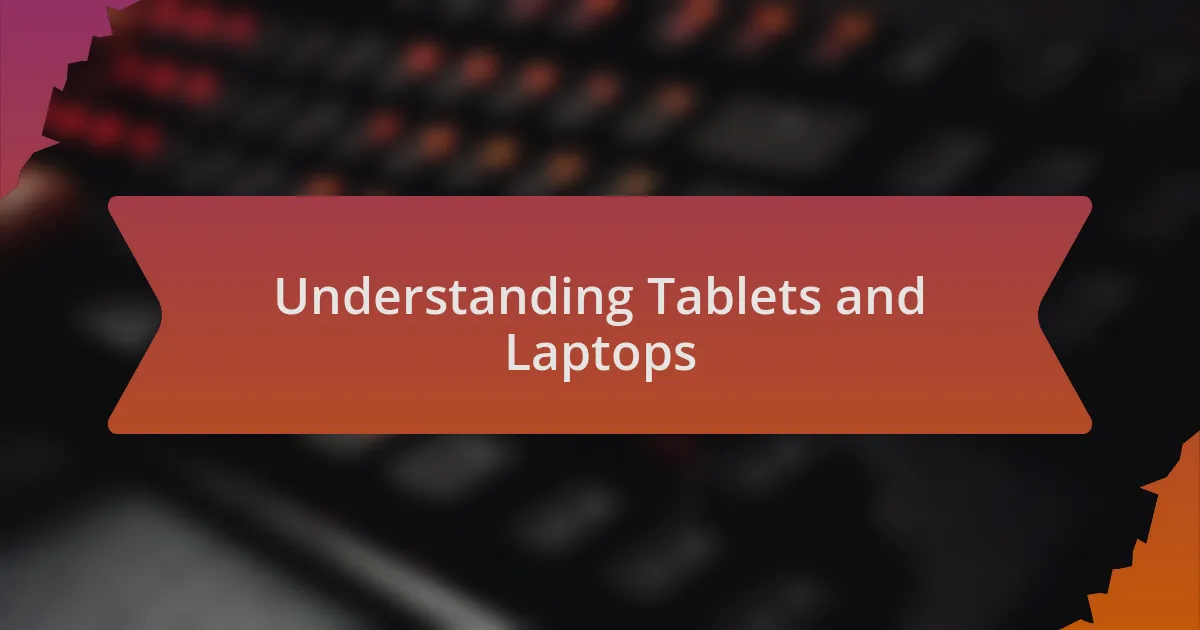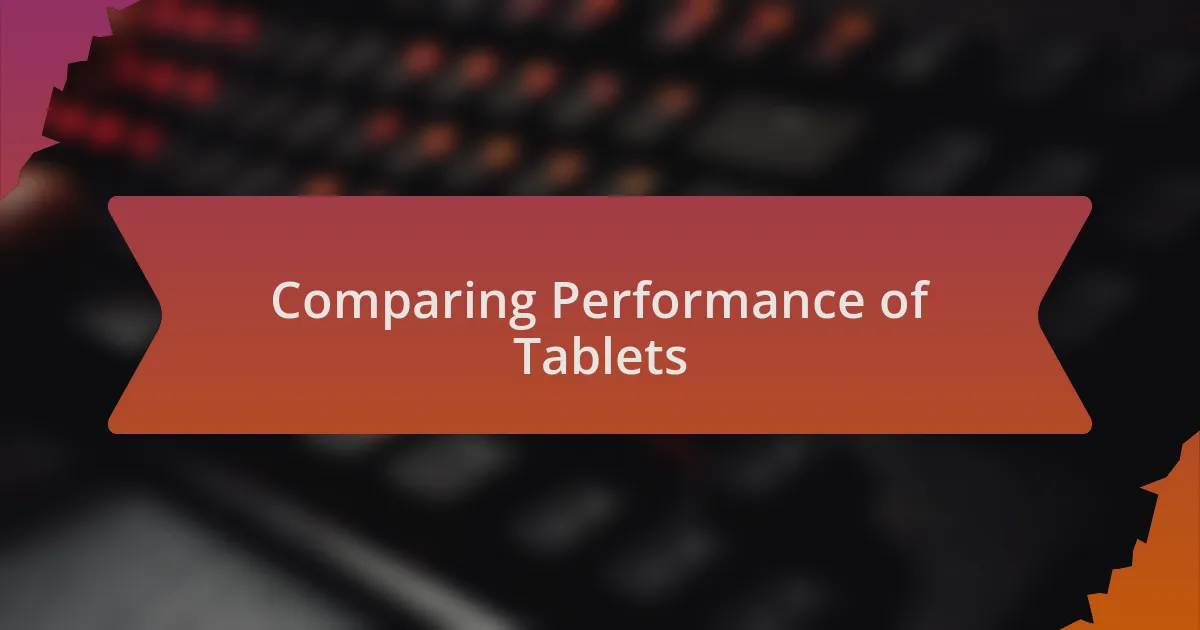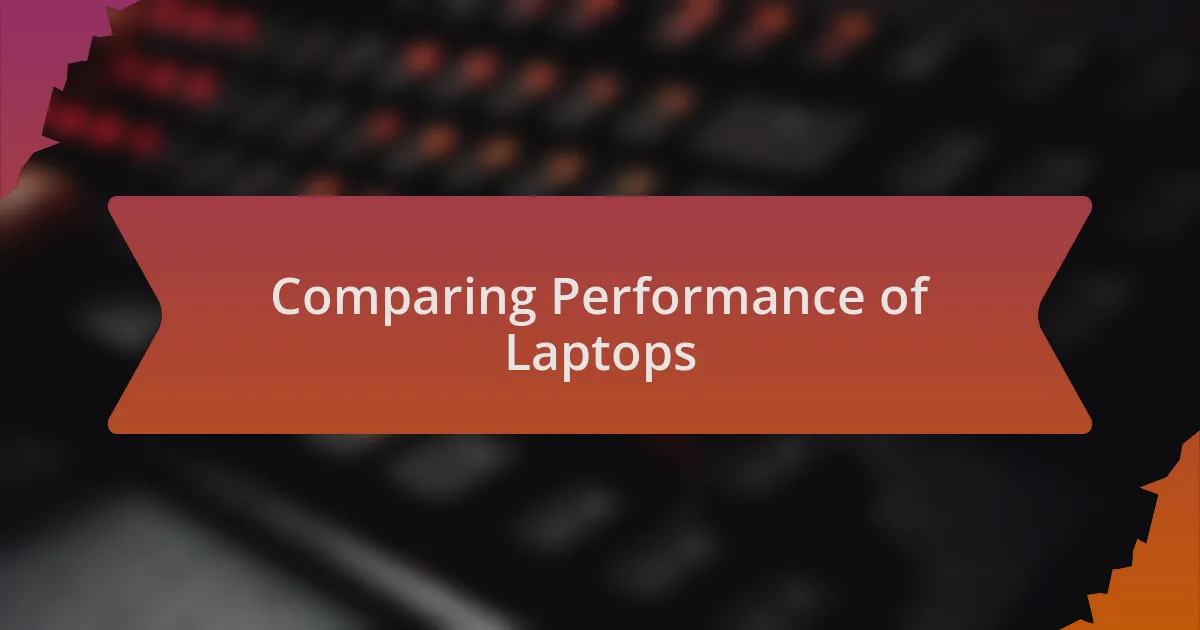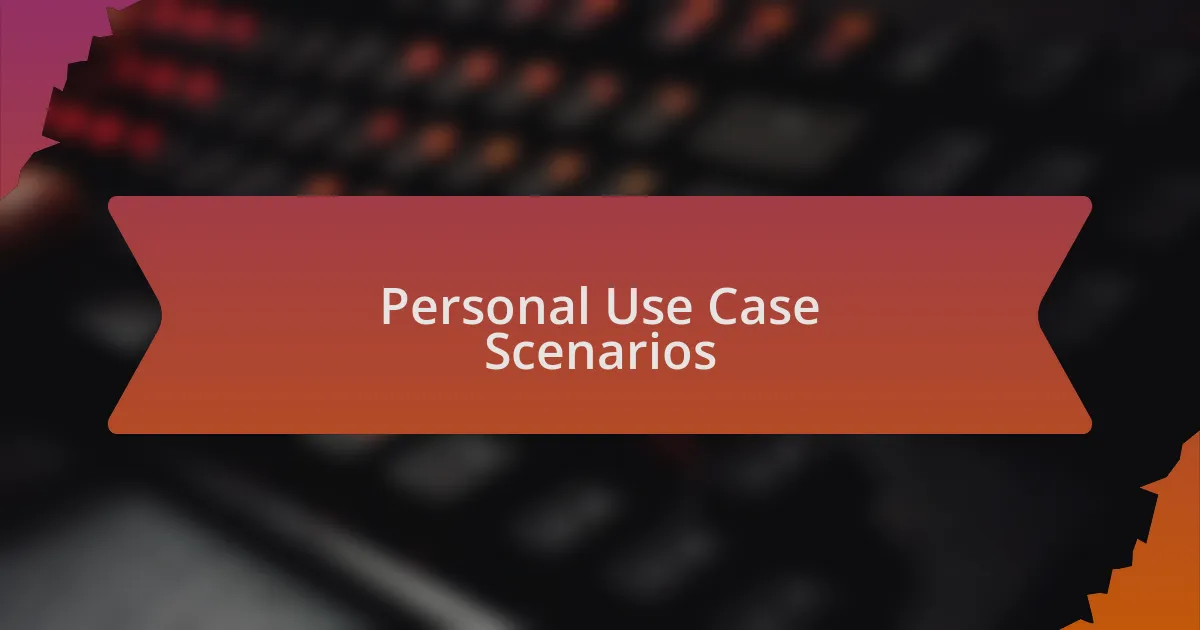Key takeaways:
- Tablets excel in portability and battery life, making them ideal for casual use and on-the-go entertainment.
- Laptops offer superior performance, multitasking capabilities, and a better typing experience, suitable for intensive tasks and productivity.
- Each device serves unique roles: tablets for creativity and quick tasks, and laptops for comprehensive work and complex applications.
- Personal use cases highlight the strengths of each device, with tablets favored for casual enjoyment and laptops for focused productivity.

Understanding Tablets and Laptops
When I first started using tablets, I was astounded by their portability. I could easily slip one into my bag and take it anywhere—perfect for when I wanted to catch up on reading or sketch ideas while waiting for a friend. But the question I always found myself asking was: could it really replace my trusty laptop?
Laptops, on the other hand, feel like an extension of my workspace. I remember sitting at my desk, fingers flying over the keyboard during an intense work session. The bigger screen and full keyboard made multitasking a breeze. It’s impressive how each device meets distinct needs. I often wonder, in what scenarios do I prefer one over the other?
In essence, there’s no one-size-fits-all answer to the tablet versus laptop debate. For casual browsing or on-the-go entertainment, my tablet shines. But when I dive deep into projects that require heavy lifting in terms of applications and software, I inevitably reach for my laptop. Each device offers unique strengths, leading to moments where I genuinely appreciate how technology can cater to my varying needs.

Key Features of Tablets
Tablets come packed with an array of compelling features that set them apart. Their touchscreen interfaces offer an intuitive experience, almost like using a smartphone but on a larger scale. I remember the first time I swiped through my favorite e-books; it felt so natural, as if the device was designed just for me. Plus, many models come with stylus compatibility, which has revolutionized my note-taking and sketching.
One of the standout qualities of tablets is battery life. Unlike my laptop, which often necessitates a frequent recharge, my tablet can last for hours, even during long flights. There was a time I was on a road trip, and I didn’t want to lug around my laptop. My tablet kept me entertained with movies and games without worrying about dying mid-journey—how refreshing is that?
Another feature that I cherish in tablets is their adaptability. They seamlessly integrate into daily life, whether I’m using it for quick video calls or scrolling through social media. I once set up my tablet on a kitchen counter to follow a recipe—much easier than having to reference a cook book. Have you ever found yourself in a similar situation, wishing for a device that simply fits in? Tablets just make life a bit easier in those moments.

Key Features of Laptops
When it comes to laptops, one of the most prominent features is their performance capabilities. Equipped with powerful processors, they can handle demanding applications like video editing software or advanced gaming quite smoothly. I remember being in a crunch to finish a project, and my laptop’s ability to juggle multitasking without lagging truly saved my day. Have you ever faced a deadline, only to watch your device slow down just when you needed it most?
Another critical aspect of laptops is the keyboard experience. Unlike tablets that rely on virtual keyboards, laptops provide tactile feedback that many of us prefer when typing long documents or essays. I still recall the satisfying click of my laptop keys as I hurriedly crafted a report for work—it added a certain rhythm to my thought process. Does anyone else share that love for a good keyboard?
Lastly, the larger screen size of laptops is undeniably advantageous for productivity. Working on a full display makes it easier to view multiple windows side by side, which I find essential for intensive tasks like research or graphic design. There have been times when I’ve had three different programs open at once, and the clarity and space of my laptop screen allowed me to focus without squinting or getting lost in tabs. Isn’t it amazing how a bigger screen can enhance our workflow?

Comparing Performance of Tablets
When I compare the performance of tablets to laptops, I often notice that tablets have come a long way in recent years. They can now handle everyday tasks with surprising speed, whether it’s browsing the web or streaming videos. Yet, I’ve found that even the best tablets sometimes struggle with heavier software, like complex graphic design tools or advanced spreadsheets. Have you ever tried to edit a video on a tablet? It can be frustrating when the device just doesn’t have enough power.
In my experience, the user interface on tablets is incredibly intuitive, allowing me to navigate apps quickly and smoothly. I find myself swiping and tapping with ease, making it feel almost seamless. However, there’s something to be said about the occasional lag when multiple apps are open. It’s like trying to multitask during a conversation—sometimes, my tablet just doesn’t keep up. Have you had similar experiences where you wish a device could read your mind?
Moreover, battery life is a noteworthy point of comparison. Tablets often outshine laptops in this area, granting me the freedom to work or play for hours on end without needing a charge. I distinctly remember sitting at a café, completely absorbed in writing an article, and not once did I have to worry about my tablet dying on me. Isn’t it liberating to think about using a device without constantly hunting for a power outlet?

Comparing Performance of Laptops
When I think about laptop performance, speed and processing power are usually what come to mind first. I remember the first time I launched a resource-heavy application, and the laptop handled it without a hitch. It felt like a breath of fresh air, knowing that it could breeze through tasks like video editing or running simulations without so much as a stutter.
Another aspect to consider is the multitasking capabilities of laptops. I often find myself juggling multiple tabs and applications, and my laptop has always been able to keep up. There’s a certain satisfaction in effortlessly switching between a browser, a word processor, and a graphic design program, all while my machine remains responsive. Have you experienced that moment when everything just clicks, and you feel in complete control of your workflow?
Then there’s the issue of thermal management—something that significantly impacts a laptop’s performance. I recall a time when I was working on a particularly demanding project, and my laptop began to heat up. It’s a reminder that while laptops can deliver incredible performance, they also require the right conditions to thrive. Does your laptop ever feel like it’s working too hard? Understanding these nuances can help maximize a laptop’s potential, ensuring it serves us well in our daily tasks.

Personal Use Case Scenarios
When I consider my personal use case scenarios, I often think about creative work. For instance, during my last project, I relied on my tablet for quick sketches and brainstorming ideas while lounging on my couch. The ease of using a stylus felt liberating; I could capture thoughts immediately without the bulk of a laptop weighing me down. Have you tried brainstorming on a tablet? It’s a different kind of flow that can spark inspiration.
Then there are those moments when productivity takes center stage. I remember sitting in a coffee shop, tapping away on my laptop while the barista prepared my favorite drink. The larger screen allowed me to tackle multiple assignments at once, and the keyboard felt incredibly satisfying. Do you find the environment enhances focus? For me, that setting transformed a simple task into a productive escape.
On the flip side, there are times when I simply want to unwind. I’ve curled up in bed with my tablet to binge-watch my favorite series, enjoying its lightweight design that feels cozy in my hands. There’s something about that simplicity that feels indulgent, as if I’m prioritizing relaxation. What’s your go-to device for a cozy night in? This versatility really highlights the strengths of each device for different scenarios.